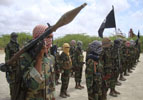
Important changes are afoot in the international response to the growing al-Shabaab insurgency in Somalia. After nearly two decades since Somalia’s central government fell, there seems to be an increasing awareness that Somalia’s chaos has become too dangerous to ignore – and a recognition that the limited ways the international community has been involved aren’t working.
The Obama administration recently indicated a shift in its approach for addressing widespread instability in Somalia that is in essence a rethinking of its unconditional support for Somalia’s weak Transitional Federal Government, or TFG. Instead, the U.S. government will engage and support effective leaders, even those who aren’t aligned with the TFG but who enjoy more local support. The leaders of Somaliland and Puntland, two of the most stable regions of Somalia, will be some of the first on the receiving end.
In an interview with Stars and Stripes on the new approach, U.S. Assistant Secretary of State for Africa Johnnie Carson emphasized that support for the TFG remains the top priority. “We want to encourage the TFG to be more than just a government in name only,” Carson told the publication, noting that if “poles of stability” are reinforced in Somaliland and Puntland, the regions could serves as a bulwark against the rise of Shabaab.
The article also quoted Africa policy analyst Richard Downie of the Center for Security and International Studies in Washington, who bluntly said that the shift in approach signals that the TFG is a “doomed project.”
The idea of expanding U.S. support beyond the TFG has been hinted at for months. Testifying for the House Foreign Affairs Committee in June, professor and Somalia expert Ken Menkhaus stated: “[T]he TFG should no longer enjoy a monopoly on external support. (…) The U.S. and other donor states should actively pursue a policy of diversification in Somalia, working pragmatically with whatever local authorities they identify on the ground who are relatively legitimate, powerful, and accountable to their communities.” It would not be prudent to dissolve the TFG altogether for the major PR victory it would provide to Shabaab and other anti-government militias, Menkhaus said. But the TFG should be dealt with as it was intended, as a transitional government, rather than a government-in-waiting.
Engaging leaders from various levels of administration and on a more local level will no doubt be “messy,” Menkhaus said during the Congressional hearing. But it meshes with the Somali way of doing things, where clan allegiance is supreme, and could be crucial at a time when Somalis need to see there are tangible alternatives to Shabaab in their own communities.
But a report issued today by Chatham House provides a timely and sobering reminder of the perennial challenge of Western engagement in Somalia: Interventions overtly backed by Western powers tend to have a counterproductive effect. “Western policies are contributing to a sense among some Yemenis and Somalis of being 'under attack' and are drawing them towards radicalisation and militancy," the report’s authors wrote.
How can the U.S. government and its allies support promising local or regional leaders without undermining them? How can the U.S. bolster grassroots initiatives that provide a viable alternative to militant groups without distorting them?
Meanwhile, the United Nations is expected in the next 30 days to debate and decide whether to enlarge the African Union peacekeeping mission in Somalia, a proposal the U.S. said it supports, though it wouldn’t specify how many additional peacekeepers should be deployed. Ugandan President Yoweri Museveni recently said Uganda is prepared to pony up the 20,000 additional peacekeepers it says are needed to bolster AMISOM – a nearly three-fold increase on the mission’s present 7,200-strong force.
Discussion of new approaches for confronting the Horn of Africa’s most volatile country comes as the United Nations said humanitarian access in Somalia has deteriorated to a low not seen since 2006. More than 200,000 people have fled the capital of Mogadishu this year alone, according to the U.N. High Commissioner for Refugees. “In short, it is difficult to conceive a situation more abject than that of the Somali refugee,” U.N. refugee chief Antonio Guterres said.
Photo: Fighters with al-Shabaab train in northern Mogadishu (AP)

